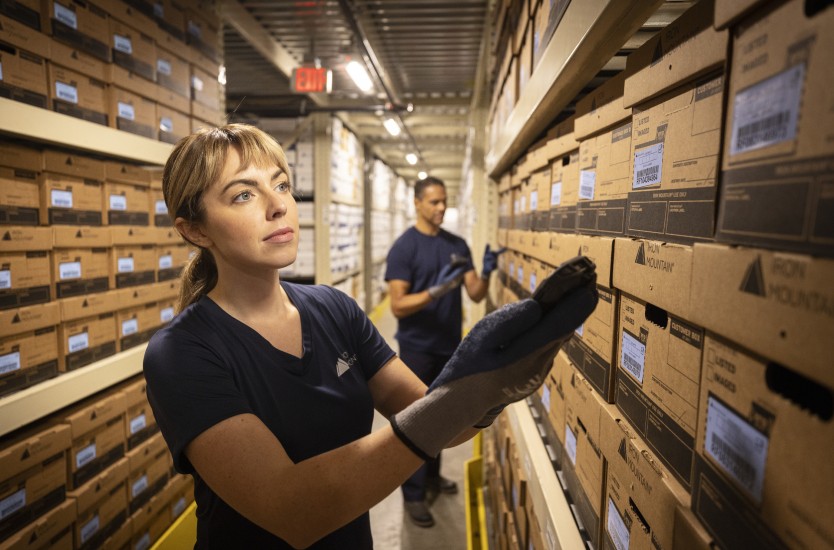Elevate the power of your work
Få en GRATIS konsultasjon i dag!
Still struggling with onsite file storage? Ditch the file room and find out about smarter options that could save you time, money and physical space.

The corporate file room, an onsite location for storing hard-copy records, is quite a challenge to manage. Single onsite file rooms — or worse, several scattered locations — complicate and raise the cost of records and information management (RIM). Dispersed records managed by different teams are very difficult to track for regulatory, legal and business requirements. Most organisations are transitioning to electronic records, while retaining their hard-copy records for the sake of compliance, which slows digital transformation.
An Expensive, Time-Consuming Liability
Local onsite records storage doesn't drive revenue; instead, it consumes experienced personnel, time and valuable real estate. These resources could be redirected to other corporate projects that would favourably increase the bottom line. Furthermore, as business changes, file rooms are not easily scalable. As a result, many organisations are gradually digitising some of their hard-copy records and incorporating them into their enterprise content management (ECM) system — a slow, expensive and error-prone process if done in-house.
In today's modern business world where employees receive and generate more records yearly, the return on investment (ROI) of storing all paper records onsite is almost always negative when compared with other solutions.
Organisations faced a similar challenge with corporate canteens. Many years ago, larger organisations installed onsite canteens for their employees' convenience and to keep them in the office to reduce tardiness after lunch. Even though food service was not a core competency, the canteens were managed and staffed by the organisations' employees, which was very expensive. Onsite canteens also had opportunity costs in staff and real estate that could have been devoted to other business priorities. Today, most organisations sensibly outsource canteen services to the food experts or do not offer onsite canteens at all.
Consider whether your staff, especially in a dispersed environment, can continue to adequately manage active records onsite and respond to regulatory or eDisclosure requests in a timely fashion given all your business priorities. Your onsite records storage, like company-managed canteens, should likely be replaced with a modern and cost-effective solution.
The Benefits of Outsourcing File Storage
In many cases, RIM staff are reluctant to relinquish onsite systems and procedures. They worry about chain of command — if the records are not in their direct physical control, how can they be sure the records are secure and properly managed? Additionally, if hard-copy records are housed remotely, can specific records be quickly retrieved? In reality, concerns about adopting a new RIM process can be allayed by working with a reputable RIM partner that provides proven outsourced file-room capabilities.
An offsite file-room solution managed by RIM professionals can:
A centralised, offsite file room managed on your behalf by a trusted third-party records storage service provider can help you redirect your limited resources toward generating additional revenue. You can store all files offsite while retaining access to active records – retrievable within hours – and archive inactive files. This helps you keep costs down while also ensuring you can respond to information requests quickly. File Room Storage Solutions will decrease cost, increase access, and ensure more reliable and accurate management of your records while giving you the best option for storing, securing and retrieving your records.
The corporate file room, an onsite location for storing hard-copy records, is quite a challenge to manage. Single onsite file rooms — or worse, several scattered locations — complicate and raise the cost of records and information management (RIM). Dispersed records managed by different teams are very difficult to track for regulatory, legal and business requirements. Most organisations are transitioning to electronic records, while retaining their hard-copy records for the sake of compliance, which slows digital transformation.
An Expensive, Time-Consuming Liability
Local onsite records storage doesn't drive revenue; instead, it consumes experienced personnel, time and valuable real estate. These resources could be redirected to other corporate projects that would favourably increase the bottom line. Furthermore, as business changes, file rooms are not easily scalable. As a result, many organisations are gradually digitising some of their hard-copy records and incorporating them into their enterprise content management (ECM) system — a slow, expensive and error-prone process if done in-house.
In today's modern business world where employees receive and generate more records yearly, the return on investment (ROI) of storing all paper records onsite is almost always negative when compared with other solutions.
Organisations faced a similar challenge with corporate canteens. Many years ago, larger organisations installed onsite canteens for their employees' convenience and to keep them in the office to reduce tardiness after lunch. Even though food service was not a core competency, the canteens were managed and staffed by the organisations' employees, which was very expensive. Onsite canteens also had opportunity costs in staff and real estate that could have been devoted to other business priorities. Today, most organisations sensibly outsource canteen services to the food experts or do not offer onsite canteens at all.
Consider whether your staff, especially in a dispersed environment, can continue to adequately manage active records onsite and respond to regulatory or eDisclosure requests in a timely fashion given all your business priorities. Your onsite records storage, like company-managed canteens, should likely be replaced with a modern and cost-effective solution.
The Benefits of Outsourcing File Storage
In many cases, RIM staff are reluctant to relinquish onsite systems and procedures. They worry about chain of command — if the records are not in their direct physical control, how can they be sure the records are secure and properly managed? Additionally, if hard-copy records are housed remotely, can specific records be quickly retrieved? In reality, concerns about adopting a new RIM process can be allayed by working with a reputable RIM partner that provides proven outsourced file-room capabilities.
An offsite file-room solution managed by RIM professionals can:
A centralised, offsite file room managed on your behalf by a trusted third-party records storage service provider can help you redirect your limited resources toward generating additional revenue. You can store all files offsite while retaining access to active records – retrievable within hours – and archive inactive files. This helps you keep costs down while also ensuring you can respond to information requests quickly. File Room Storage Solutions will decrease cost, increase access, and ensure more reliable and accurate management of your records while giving you the best option for storing, securing and retrieving your records.
Få en GRATIS konsultasjon i dag!

